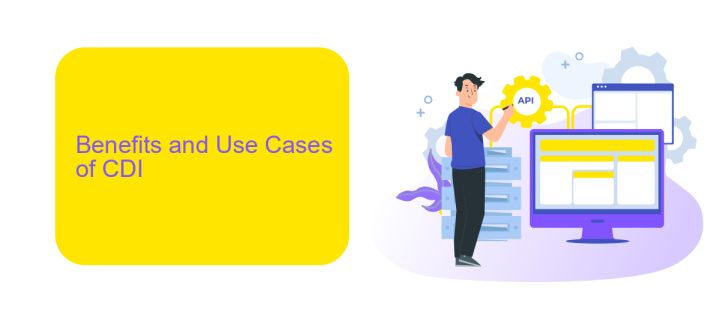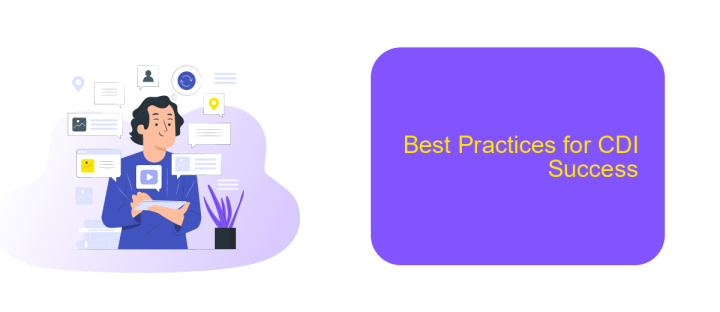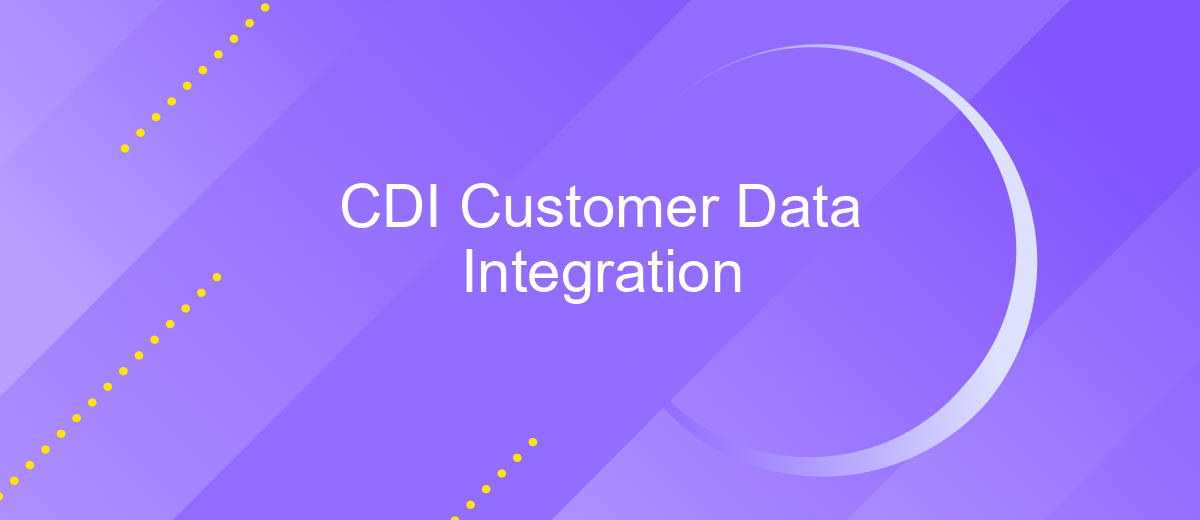CDI Customer Data Integration
Customer Data Integration (CDI) is a crucial process for businesses aiming to consolidate and manage customer information from diverse sources. By integrating data, companies can achieve a unified view of their customers, enabling more personalized interactions and informed decision-making. This article explores the importance of CDI, its benefits, and best practices for successful implementation.
Introduction to CDI Customer Data Integration
Customer Data Integration (CDI) is a crucial process for businesses aiming to consolidate and manage customer information from various sources. By integrating data, companies can achieve a unified view of their customers, which enhances decision-making and customer experience.
- Unified customer profiles
- Improved data accuracy
- Enhanced customer insights
- Streamlined marketing efforts
One effective tool for setting up integrations is ApiX-Drive. It simplifies the process by allowing businesses to connect and synchronize data across multiple platforms effortlessly. With ApiX-Drive, companies can automate data flows, ensuring that customer information is always up-to-date and accurate, thereby supporting better customer relationship management and operational efficiency.
Benefits and Use Cases of CDI

Customer Data Integration (CDI) offers numerous benefits, including enhanced data accuracy, improved customer experiences, and streamlined operations. By consolidating data from multiple sources, businesses can create a unified view of their customers, allowing for more personalized marketing and service efforts. This not only increases customer satisfaction but also drives higher conversion rates and loyalty. Furthermore, CDI helps organizations maintain data consistency and reliability, reducing the risk of errors and ensuring compliance with data protection regulations.
One of the primary use cases of CDI is in marketing automation, where integrated customer data enables more effective targeting and segmentation. Additionally, CDI is crucial for customer service departments, providing agents with comprehensive information to resolve issues quickly. For businesses looking to simplify the integration process, services like ApiX-Drive offer automated solutions to connect various data sources seamlessly. This not only saves time and resources but also ensures that data is always up-to-date and accessible across different platforms, enhancing overall operational efficiency.
Key Features and Implementation

Customer Data Integration (CDI) is essential for businesses aiming to consolidate customer information from various sources into a single, unified view. This helps in enhancing customer experience, improving decision-making, and streamlining operations.
- Data Consolidation: Aggregates customer data from multiple channels and systems into a centralized repository.
- Data Cleansing: Ensures that the data is accurate, consistent, and free from duplicates or errors.
- Real-Time Updates: Provides up-to-date customer information to all integrated systems and platforms.
- Scalability: Adapts to growing data volumes and increasing numbers of data sources.
- Security: Implements robust data protection measures to safeguard sensitive customer information.
Implementing CDI involves selecting the right tools and services to facilitate seamless integration. ApiX-Drive, for instance, offers a user-friendly platform to connect various applications and automate data flow without requiring extensive coding knowledge. This can significantly reduce the time and effort needed for integration, allowing businesses to focus on leveraging their consolidated data for strategic initiatives.
Best Practices for CDI Success

To achieve success in Customer Data Integration (CDI), it is essential to have a clear strategy and a well-defined plan. Start by identifying your goals and the specific data sources you need to integrate. This will help in creating a roadmap that aligns with your business objectives.
Choosing the right tools and platforms is crucial for effective CDI. Leveraging services like ApiX-Drive can simplify the integration process by providing seamless connectivity between various data sources and applications. This ensures that your data is consistently accurate and up-to-date.
- Define clear objectives and goals for your CDI project.
- Select reliable tools and platforms like ApiX-Drive for integration.
- Ensure data quality and consistency across all integrated sources.
- Regularly monitor and update your integration processes.
- Train your team on best practices and the use of integration tools.
By following these best practices, organizations can enhance their CDI efforts, leading to improved customer insights and more informed decision-making. Continuous monitoring and adaptation are key to maintaining the effectiveness of your CDI strategy.
- Automate the work of an online store or landing
- Empower through integration
- Don't spend money on programmers and integrators
- Save time by automating routine tasks
Future Trends and Innovations in CDI
The future of Customer Data Integration (CDI) is poised for significant advancements, driven by emerging technologies and evolving business needs. One of the key trends is the increasing use of artificial intelligence and machine learning to enhance data accuracy and predictive analytics. These technologies can help businesses better understand customer behavior and preferences, leading to more personalized marketing strategies and improved customer experiences. Additionally, the integration of real-time data processing capabilities will enable companies to make quicker, data-driven decisions, providing a competitive edge in fast-paced markets.
Another important trend is the growing importance of seamless integration services, such as ApiX-Drive, which streamline the process of connecting various data sources and applications. These services simplify the integration of diverse customer data systems, reducing the complexity and time required for manual data handling. As businesses continue to adopt more cloud-based solutions, the demand for efficient and reliable integration platforms will only increase. Innovations in data privacy and security measures will also play a crucial role, ensuring that customer data is protected while enabling businesses to leverage this valuable asset effectively.
FAQ
What is Customer Data Integration (CDI)?
Why is CDI important for businesses?
What are the key challenges in implementing CDI?
How can businesses automate CDI processes?
What are the benefits of using an integration platform for CDI?
Time is the most valuable resource in today's business realities. By eliminating the routine from work processes, you will get more opportunities to implement the most daring plans and ideas. Choose – you can continue to waste time, money and nerves on inefficient solutions, or you can use ApiX-Drive, automating work processes and achieving results with minimal investment of money, effort and human resources.


